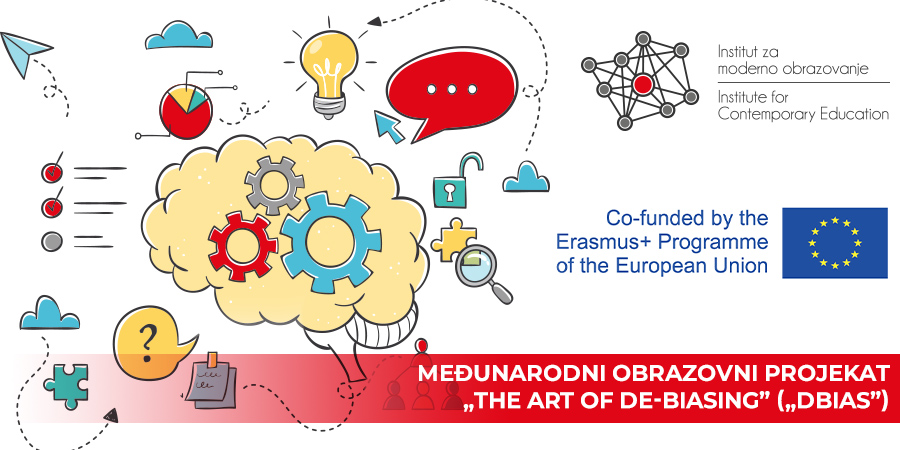AN IMPORTANT STEP FOR EDUCATION: ICE and Erasmus+
are bringing the international “dBias” education project to
Serbia
Work is underway on creating the first IT tools for preventing cognitive bias in teaching
Together with partners from Great Britain, Bulgaria, Belgium, Holland and Turkey, the Institute for Contemporary Education (ICE) will implement a three-year Erasmus+ project aimed at creating IT tools, strategies and methods for preventing cognitive bias in education.
As part of the project “The Art of De-biasing (dBias)”, teams comprising top experts in education and psychology from partner countries will create an innovative and unique curriculum and a functional didactic and methodical technology for the professional development of teachers.
Artevelde University of Applied Sciences from Belgium and the ICE are project leaders for the teacher training component.
The ICE’s representative in the team of experts is Dr Svetlana Belić Malinić, the Institute’s Academic Director and expert in international education.
What are cognitive biases and why should every teacher know about them?
In the late 1970s, education experts and analysts concluded that students have distinctive interpretations of social situations due to the discrepancy between the increased scope of subject-related information received in each grade and the students’ capacity to process and comprehend lesson content and scientific terms.
Since learning is a cumulative process, each new piece of information is added to what the students know (or think they know) about a topic. If a student has a solid base, new information is more easily incorporated into their cognitive system, and the student receives functional, permanent and practical knowledge. However, if the students’ previous knowledge is poor or incomplete, the process of acquiring new knowledge clashes with the previous learning models that have proven to be wrong. This can lead students to include new information inadequately in their framework of understanding, thus creating a cognitive bias.
Considering the fact that education is facing more and more challenges and that students come to class with prior knowledge that includes certain misconceptions, it is no secret that even the best students give correct answers based on words and patterns learnt by heart.
Consequently, in order for students to develop practical knowledge and understand the content, and for teachers to have good teaching outcomes, the ICE and its partners will spend the next three years working on the “dBias” project, developing practical solutions designed to fully transform the teaching process and launch a new education paradigm.
ICE GIVES TEACHERS IN SERBIA AN EXCLUSIVE OPPORTUNITY – they will be the first in the world to undergo professional training for preventing cognitive bias
During the past three decades of research in education, there have been numerous constructivism-inspired attempts to transform misconceptions into scientifically acceptable conceptions. However, teachers lack generic or specific strategies to achieve this. In addition to theoretical development, the ICE and its partners will create the first practical IT tools, strategies and functional methodology for identifying and managing cognitive biases. The target group in the project will be primary and secondary school teachers, university professors, educators in adult education, and students over 16.
The project will provide teachers in Serbia with a unique opportunity to be the first in the world to attend professional training that will enable them to recognise cognitive biases in students’ perceptions. This is a revolutionary innovation in teacher education and a radical step towards transforming teaching models.
What will teacher training look like in the international “dBias” project?
Together with a consortium of partners from Great Britain, Bulgaria, Belgium, Holland and Turkey, the ICE will develop interactive video materials with scenarios depicting models of the most frequent cognitive biases, tools for assessing, identifying and removing biases, and other didactic materials and cognitive teaching resources.
In addition, the project team will develop a network platform with an adaptive learning algorithm, which they will use to collect design behavior and decision-making patterns. Experts in the field of education will examine these patterns in focus groups and use them to develop teaching strategies for managing and reducing biases. The platform will enable teachers to create reports on classes or groups of students that will allow them to adapt their teaching methods and activities.
Taking into account that currently there are no education strategies based on identifying and eliminating cognitive biases, and that the teachers lack the formal training and practical tools to achieve this, creating a network platform is a remarkable step for the education system that will enable teachers to recognise students’ misconceptions and biases as well as the way in which they affect knowledge acquisition.
The key goals of “dBias” are:
- improving student-teacher communication through increased awareness and understanding of the features, number and impact of cognitive biases;
- creating tools for collecting data on bias-related behaviour: sensitivity, resistance, impact and intensity of biases among teachers and students;
- analyzing data and developing teaching strategies for eliminating biases and improving student-teacher communication;
- introducing innovative and transversal tool packages in the context of education and adult education.
Register for the ICE newsletter and learn everything about the “dBias” project.
Partners:
- BASH ART CREATIVE LTD, Great Britain
- Национален учебен център, Bulgaria
- Koç University, Turkey
- Institut za moderno obrazovanje, Serbia
- Artevelde University of Applied Sciences, Belgium
- EduLin, Holland
- DDL – Delft Digital Learning, Unipessoal LDA, Portugal
- Drawing to Health, Holland


 Srpski
Srpski





